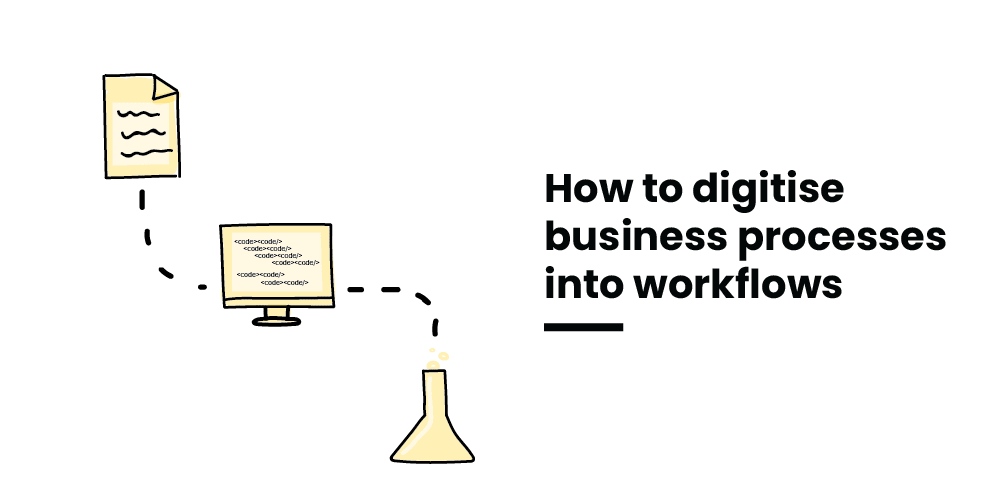
How to digitise business processes into workflows
What’s Your Business Process?
A significant portion of your day and your company’s operations is likely dedicated to fulfilling business processes. A good business has solid processes; however, a great business ensures that these processes enhance, rather than detract from, the value their organisation offers. This article explores how business processes can be digitised into workflows, ensuring consistency, reducing business risk, and enabling scalability.
Your Business Process IP
Business processes are pervasive across your organisation. According to Gartner, “A business process is an event-driven, end-to-end processing path that starts with a customer request and ends with a result for the customer.” This broad definition implies that activities or tasks are often chained together—meaning that for something to happen, several steps must be completed. This often results in delays as you wait for approvals or further information.
Business processes vary significantly across industries, and you’ve likely developed unique intellectual property (IP) through your own processes. If you trade on this, it’s crucial that your IP is documented and repeatable. Consider whether you have specific IP that addresses these common business processes:
• Manufacturing: Order processing, engineering change control, product assembly, quality assurance, maintenance.
• Finance: Invoicing, risk management, billing.
• Healthcare: Medical assessment, drug approval, financial processes.
• Banking: Customer onboarding, credit checks, risk assessment.
• Travel: Agent billing, trip booking, business travel management.
• Procurement: Purchasing, invoice reconciliation, accounts receivable.
• Advertising: Cost estimation, cost approval, reviewing.
• Sales and Marketing: Product delivery, development, market research.
What is a Workflow?
Now that we’ve identified the need, how do you actually digitise your business process? The answer lies in workflows.
Workflows are a series of steps that outline a process. A workflow is “a
sequence of tasks that processes a set of data.”
For software development, we often utilise technologies such as Codebots to quickly implement and customise a workflow within an
application. As a software owner, you can control the workflow in the admin section of the application, which we can customise to fit your
specific business process.
In its basic form, the workflow behaviour tracks the status of tasks within a database, allowing administrators to manage various states and transitions efficiently. For a visual representation, check out the latest instructional video from Codebots’ blog that demonstrates how to set up and manage your business processes using workflows.
What’s the Business Value of Digitisation?
Now that you’ve considered your business processes and identified areas where you’ve likely created unique IP, why should you digitise them? Here are three key reasons:
1. Save Costs and Increase Efficiency
Human resources are expensive and sometimes inefficient. As McKinsey & Company notes, “Automating business processes can improve service quality, increase productivity, and save costs.” By automating repetitive tasks, your team can focus on what they do best—building relationships and working on creative, high-value projects.
2. Generate New Revenue Through Licensing
If you’ve developed a unique process that solves a problem in your industry, others are probably facing the same challenges. As seen with Tanda, which developed a time management software solution, there is potential to license your processes as a Software-as-a-Service (SaaS). This turns your IP into a recurring revenue stream, allowing you to monetise your expertise.
3. Reduce Key Person Risk
Failure to digitise your business processes can pose a risk if crucial knowledge is held by a few key individuals. This is sometimes referred to as the ‘bus test’—how would your business continue if key personnel were suddenly unavailable? Digitising processes creates redundancy and ensures business continuity. A study by Deloitte indicates that “organisations that have automated processes are better positioned to manage risks and handle personnel changes effectively.”
Real-World Example: Aptus’ Digital Transformation
A recent client, Aptus, had developed a unique business process for designing and quoting specifications for new buildings, but their IP was trapped in an Excel spreadsheet and known by only a couple of employees. By migrating this process into a web application, we enabled the company’s partners and employees to self-serve using the system, reducing costs and facilitating scalability.
How to Get Workflows Customised to Your Process
Ready to digitise your business processes? The first step involves defining your business problems and scoping a solution. No matter what
tools you use, they must be properly wielded to produce the desired outcomes. As Forrester
Research emphasises, “successful digital transformations hinge on a well-defined and strategic approach.”
By following a detailed, solution-focused scoping process, we ensure your business processes are digitised in the most effective way possible.






